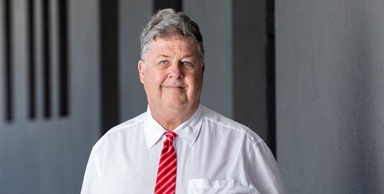Loading component...
At a glance
- Colin Aynsley FCPA oversees all aspects of the finance, IT and property functions at Lifeline Darling Downs and South West Queensland. He is also the former CFO of the Cancer Council in Queensland and CFO at the Uniting Church in Australia.
- In Aynsley’s commercial career, he worked at Universal Press, JLG manufacturers and Bundaberg Brewed Drinks. He has been in the not-for-profit sector since 2000.
- Aynsley was educated at Macquarie University and gained his CPA in 1983 and FCPA in 2015.
- Lifeline Darling Downs and South West Queensland employs more than 300 staff, is supported by more than 500 dedicated volunteers and has a turnover of close to A$23 million.
My role: simplifying the jargon
Most of my duties relate to IT and financial functions, but the real job is about explaining to people where the not-for-profit (NFP) is sitting financially.
In an NFP, there are a lot of non-financial people who don’t understand the jargon, so I try to express all things as stories. Financial information means nothing until it’s relevant to them. I can’t effect financial change without them, and I need them to want to come to me.
We have four main income streams. State and federal government grants provide community human service programs in Toowoomba, on the Darling Downs, and in far south-west Queensland.
Our second is the social enterprise business division, which includes 16 “op shops”, two “containers for change” depots and an overseas export market.
Our third comes from our disability arm, and our fourth income stream is from fundraising activities and general donations.
My role is to partner with our managers to ensure that money is spent intelligently within the required period – if you don’t spend government money wisely, you lose it.
As we operate in a rural environment, we need to be able to get the right people there – if you’re living in the outback, where do you find a financial counsellor? It’s about much more than putting together a straight profit and loss sheet.
Game changers: focus on values
Twenty years ago, I worked for the largest printer in Australia and was heavily involved in manufacturing-related accounting, but at the age of about 40, I began to feel there was more to life than making money for other people.
I worked for a number of NFPs from that age onwards. I joined the Uniting Church in Australia, then the Returned and Services League of Australia and then the Cancer Council Queensland.
I realised that, if I managed the money well, more could be spent on individuals in need.
The most important difference was that, in a commercial context, people are focused on return. In the NFP arena, they are focused on mission and values. That can sometimes mean you make a loss.
My challenges: strong asset position
With Lifeline Darling Downs, the big issue is making sure the organisation has a solid asset and cash base.
There are many great NFPs that haven’t built enough cash reserves around them. My challenge is explaining that you have to put some aside, because if something like COVID-19 comes along, you have the resources to weather that storm.
The treasury function demands I invest in things that keep a return coming. Do we lease properties or buy them? What sort of loans do we take? If we make a profit, how much do we keep in reserve and how much do we spend? Getting people to understand profit in our field is more difficult than you might think.
I have witnessed first-hand the financial distress that the seven-year prolonged drought has brought to our region of operation. We’re dealing with suicides, self-harming, domestic violence and relationship breakdown.
In the past seven to eight years, we have allocated almost A$1 million to our farmers and their families. Since the advent of Zoom counselling sessions, we have witnessed a positive increase in men accessing counselling online. More needs to be done – we operate in over 550,000 square kilometres. Queensland is a very big state, and we continue to do our best to help those most in need during these unpredictable times
Lessons learned and best advice
- How can you tell the story about the financials in a way that non-accountants can understand? It is important that you create a culture where people live financials, and you are the first port of call when they are seeking advice.
- An in-depth knowledge of IT covering all aspects of the organisation is critical, as is good software integration and one pool of data that covers all aspects of the organisation.
- When you do something, do it once. It is so important to ensure that optimum efficiency is achieved in running an organisation and that transactions in particular do not need to be re-inputted many times. Lower operating costs mean reserves that can go towards your mission.
- For NFPs, it is always best to hold some money back to invest in infrastructure and give you the ability to expand or weather a storm. Having the right treasury model and appropriate borrowing are critical in this area. Also, having sound internal and external auditing processes is essential.

